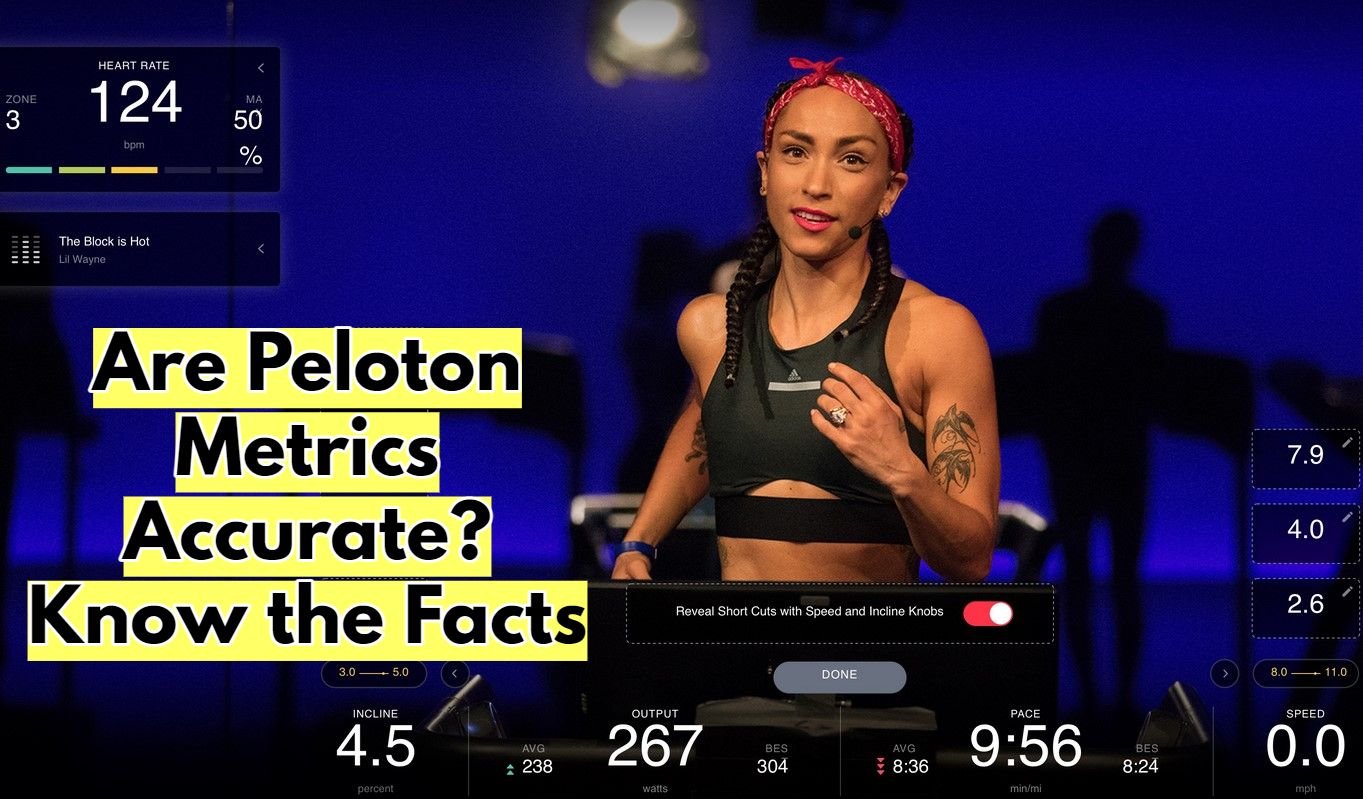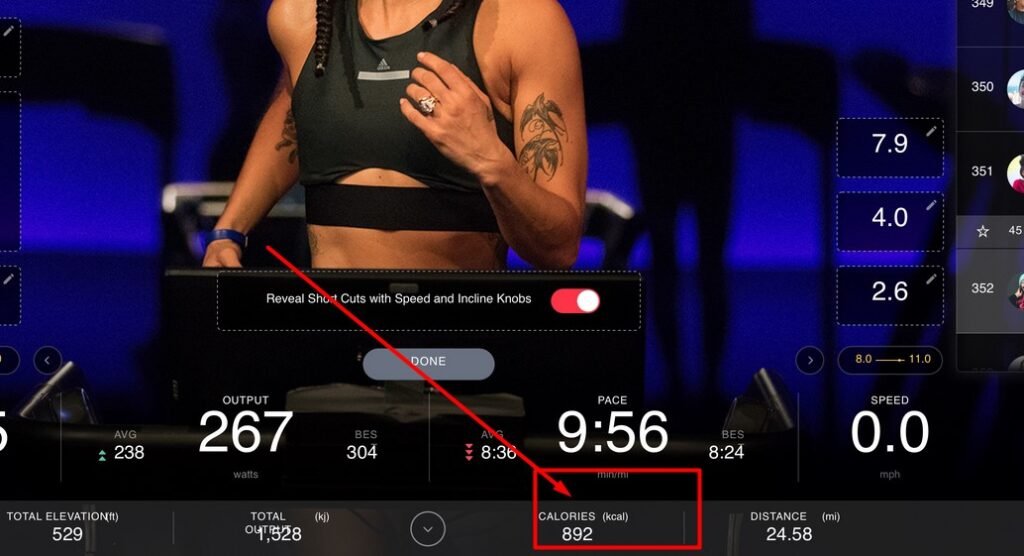As a whole, Peloton metrics isn’t 100% accurate. Peloton claims 10% inaccuracy or deviation in their machine metrics and It may vary among machines also. Many fitness experts claims that, exercise machine’s metrics may vary or seen inaccuracy level upto 15% to 20% for not counting all the individual factors involved during exercise.

Peloton, the popular fitness brand known for its at-home workout equipment and classes. There is no doubt that Peloton produces high-quality equipment and offers a great workout experience.
However, there have been several reports of inaccuracies in the peloton’s machine metrics, including distance, calories burned, and heart rate. These errors can be frustrating for users who are trying to track their progress and see results.
So, How Accurate Are Peloton Stats? Here in this blog, I will dig out all those things one by one. Stick with me.
Related Read:
Peloton Touch Screen Not Working? How to fix? (Full Guide)
Peloton Resistance Knob Not Working? Here’s How to Fix It.
Peloton Fastboot Mode Explained (Complete Guide)
Are Peloton Calories Accurate?

No, Peloton calories isn’t 100% accurate. Peloton claims 10% inaccuracy for their machines as I mentioned above.
When it comes to working out, accuracy is key. You want to make sure you’re getting the most out of your efforts, and that means being able to accurately track your progress. When it comes to Peloton bikes, one area where people often want to know more about is calorie burn.
So let’s take a look at how accurate Peloton bike calorie counts are. First off, it’s important to understand that there are a lot of factors that go into calculating calories burned during exercise. Things like intensity, duration, and body weight all play a role.
How they calculate calories on peloton?
That being said, Peloton does use some pretty sophisticated technology to estimate calories burned during a ride. The bike has sensors that track things like heart rate and power output. Based on this data, Peloton is able to calculate an estimate of the number of calories you’ve burned during your ride.
Peloton Calorie Calculator
So how accurate is this estimate? Well, it’s actually pretty darn close. Studies have shown that Peloton bike calorie counts are typically within 10% of the actual number of calories burned (when compared with other fitness tracking devices).
Calories burned per minute = MET x body weight (Kg) x 3.5 ÷ 200
Where MET stands for: A unit of measure of the rate at which the body expends energy that is based on the energy expenditure while sitting at rest and is equal to 3.5 milliliters of oxygen per kilogram of body weight per minute — called also metabolic equivalent
How much calories do you burn in a peloton session?
Simply, You can expect to burn somewhere between 400-600 calories in a 60-minute peloton spin class. Researchers have found that the average spin class burns between 300 and 600 calories.
So if you’re looking for a way to accurately track your calorie burn while riding a Peloton bike, rest assured knowing that the numbers you see on the screen are pretty darn close to reality!
Are peloton miles accurate?
Yes, Peloton miles are nearly accurate with a maximum absolute error of 0.3mph (at low power) and RMS error of 0.07mph, which is good given that the Peloton only shows speed to one decimal place.
How they calculate distance and speed on peloton?
Simply, The Peloton Bike calculates speed based on power alone; rider weight is irrelevant, and cadence and resistance only affect power.
Are peloton watts accurate?
The answer is NO, Peloton Bike doesn’t take immediate Output readings. Due to production uncertainty, Peloton predicts 10% Bike-to-Bike output variations.
How they calculate watts on peloton?
Peloton watt is estimated by dividing the average output time by 1,000. *The average output time is the number of seconds in the ride.
For example, if you ride at an average of 100 Watts for 2,700 seconds (45 minutes), you will have put out 270 KJ.
Peloton Calories Burned Vs Apple Watch
Now that you know there are multiple ways to measure calorie expenditure, let’s compare peloton and apple watch calories.
Peloton and apple watch don’t match since they calculate calories differently. The peloton bike’s built-in watts meter estimates calories. On the other hand, Apple Watch monitors heart rate.
Which calories estimation is more accurate, Apple Watch or Peloton? The apple watch’s heart rate tracking is more accurate than the peloton bike’s metabolic equivalent approach. Direct and indirect calorimetry can correctly quantify calories burned.
How to Track Your Progress With Peloton? Few Easy Ways
Tracking progress is important because it helps you stay on track and see how much you’ve already accomplished. *Peloton bikes automatically save your metrics. Peloton digital users must track stats.
You can track the following metrics manually —
- Track total calories burned daily and compared it with your prior weeks. Try to beat your weekly record.
- Track your weekly miles. Add extra workout volume to improve endurance.
- The power meter measures intensity. You should train in your chosen power zone.
- Increasing sessions is another technique to implement progressive overload.
How Accurate Is The Peloton?? Power Test!! See this Video
In Summary
In summary, peloton metrics isn’t 100% accurate. Peloton claims 10% inaccuracy found in their machine metrics and It may vary among machines also.
If you’re looking to get in shape, there’s no shortage of options out there. But if you’re the type of person who likes to see results and track your progress, Peloton is a great option.